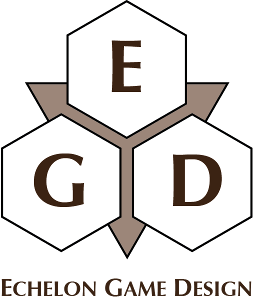What if… we turn things around a bit?
Roleplaying games almost all follow the same model for task resolution. You declare an action, then roll dice to see how it turns out. There might be additional rolls (such as rolling damage after seeing if your attack hits) or secondary effects (yes-and, yes-but, no-but, no-and results) to be determined afterward.
Tabletop games, especially board games, often have more deterministic action resolution. In fact, many have no randomization beyond choosing first player: your pawn attacks your opponent’s knight, the knight is captured. There are many simple, classic games that your random element — dice roll — happens at the start of your turn and you decide what to do. For instance, in Backgammon and Sorry you roll the dice and then decide how to apply them to move your markers.
Can we do something similar in Echelon? Instead of “declare, roll to determine success and effect”, “roll, act deterministically”?
I think we can.
Euro Dice System
Keep the dice assignment by tier (Basic d4, Expert d6, Veteran d8, Heroic d10, Champion d12, Paragon d16, Legendary d20, Epic d24, Mythic d30).
Have a concrete list of base rolls, probably 5-10 of them. These might be divided by type of talent (martial, skill, spell), ability score (strength, dexterity, wisdom), or metaphysical considerations (earth, fire, void). Each talent will be associated with one or more roll, and have abilities at each tier that have target numbers with particular rolls.
Each turn, you roll four dice, based on your talents: your tier die (which can apply to any roll), up to one cornerstone die (most will apply to two types of roll), up to one capstone die (also might apply to two or more types of roll), and as many common dice as needed to get to four total. Roll the four to see what resources you have available this round.
You can apply a die to whatever ability you want, if it meets the target number for that type of roll. However, you can apply only one common die per roll type. For instance, if you roll 2d8 common martial for an attack, you stand a pretty good chance of getting the success you need… but apply only one die to the effect. If you roll d8 martial and d8 void you might succeed on one or the other (which give you different options), or both (which might let you combine them, such as if you’re a martial initiate). If your cornerstone supports them — a martial tradition that focuses on a certain mode of metaphysical combat, say — the die rolled for that talent might be used to meet the martial or void requirement on the ability.
Given four dice and a reasonably close arrangement to what you might want to do — you don’t roll a bunch of ‘martial dice’ to cast a spell — you stand a good chance of being able to use an ability from your current tier… and if you don’t you can probably still do something from a lower tier.
Other Thoughts
The core of this model is described above, but a couple things come to mind that need to be considered.
When to Roll
Obviously you don’t roll before the action starts, so the first roll happens at the start of your first turn (or even at the start of the action, before your turn). For ease of play, after that you roll at the end of your turn. This gives you an opportunity to review the options available to you so you’re ready at the start of your next turn.
No Good Action
Normally in an RPG you can declare an action that fails, achieving nothing that round. That’s unfortunate, but happens. You tried.
In the model described here, though, it’s possible to roll and end up with nothing actually workable or useful. It feels like you can’t even try. While there is a certain element of truth to this — sometimes you’re put in a position you can’t succeed at something — it likely won’t feel good.
So, if you find that you can’t do anything useful, rather than being a full failure, do-nothing round, you can take a token that can be used next round. Of all the types you rolled this round, you can take a token that will let you add to or reroll a roll of that type in a later round (not yet determined). So, if you try to roll a mix of martial and fire, and aren’t able to do what you wanted to do, you can take a fire or martial token that will help you the next time.
Spending Dice Out of Turn
As written, this model means effects are applied deterministically. If you have the success needed to overcome an opponent’s armor, you hit for damage. If you have the successes needed for a spell, the spell works to full normal effect.
This applies against PCs as well. There are no saving throws or the like here, you need to have the defense bought up to where it can’t be beaten.
This is all on purpose, to speed play. As an optional rule, if you roll dice at the end of the last turn, special characters (PCs and major NPCs) can spend those dice out of turn to augment or replace an overcome defense. A fighter might spend a martial die to parry an attack, a wizard might spend a spell die to cast an immediate shield to do the same. These dice are lost to the player on the next turn, so it’s trading future ability for immediate defense.
